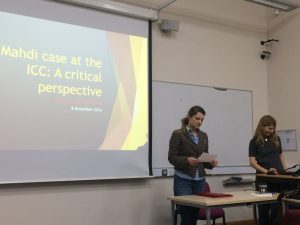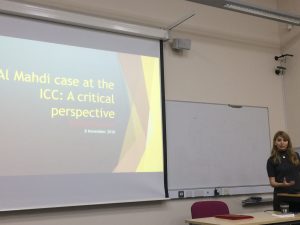CeCIL and the Centre for Cultural Heritage were delighted to welcome Dr Marina Lostal (The Hague University) for a joint seminar on international law and cultural heritage. PhD student Eric Loefflad reports
On Tuesday November the conversation on international law and cultural heritage continued with a fascinating talk by Dr. Marina Lostal of The Hague University entitled ‘The Al-Mahdi Case at the International Criminal Court: One Step Forward, Two Steps Back.’ This event was co-hosted by CeCIL and the Centre for Cultural Heritage and provided an excellent compliment to the talk given by Dr. Sophie Vigneron the previous week. Here Marina presented a critical appraisal of the International Criminal Court’s (‘ICC’) first ever prosecution for cultural heritage destruction and what it means for the future of both cultural heritage law as well as international criminal law.
In setting a context for this analysis, Marina provided an overview of the international legal regime covering cultural heritage. Here she made the observation that both medi a attention and law making on this issue are subject to a great degree of ‘trending’ which problematically creates redundancy and makes the legal regime as a whole more difficult to disentangle. Furthermore, this problem of ‘trending’ distorts the reality of who is actually responsible for cultural heritage destruction. For instance, while much attention has been given to jihadist groups destroying sites through ideologically-motivated public displays, in the ongoing Syria Civil War most of the plunder has been done by rebel and government forces for a variety of economic and strategic reasons.
a attention and law making on this issue are subject to a great degree of ‘trending’ which problematically creates redundancy and makes the legal regime as a whole more difficult to disentangle. Furthermore, this problem of ‘trending’ distorts the reality of who is actually responsible for cultural heritage destruction. For instance, while much attention has been given to jihadist groups destroying sites through ideologically-motivated public displays, in the ongoing Syria Civil War most of the plunder has been done by rebel and government forces for a variety of economic and strategic reasons.
In discussing the Al-Mahdi case, additional context is provided for the situation in Mali, which like so many postcolonial nations, is burdened by the socially divisive legacies of colonial administration. It was through a recent conflict emanating from the division of Mail between a largely sedentary south and historically nomadic north that the events of this case took place. Here national liberation forces from the northern region were joined by various jihadist elements and the defendant Ahmad Al Faqi Al-Madhi used his position as head of a force of Islamist ‘morality police’ to destroy several ancient mausoleums and a mosque door in Timbuktu.
In analysing the handling of the case at the ICC, Marina presents the very particular usage of language in the prosecutor’s charge. Against claims that this destruction of cultural heritage was a ‘victimless crime,’ Chief Prosecutor Fatou Bensouda issued a charge invoking the acts of destruction as a ferocious assault upon the dignity of the people who placed intangible, spiritual value on the destroyed sight. Yet, for Marina, this anthropocentric understanding of cultural heritage is deeply difficult to justify through the law governing this subject matter.
Here she points to the reality that the international law of cultural heritage is traceable to the mid-Eighteenth writing of Emer de Vattel and received its modern standing through the 1907 Hague Convention. On the other hand, human rights law only came into being after the Second World War. As such, the law of cultural heritage is readily distinguishable from the law of human rights despite what the ICC’s anthropocentric interpretation suggested. Furthermore, this raises the issue of law’s protection of cultural property created by cultures/religions that no longer exist where these heritage sites are located. The example was given of the Buddha statues destroyed by the Taliban in Afghanistan which have not been worshiped by the local population for centuries. After all if the ICC’s touchstone for the Al-Mahdi case was the cultural heritages meaning to the people who valued it, then how can this legal rationale protect sites that do not invoke the same kind of valuation?
The issues Marina presented certainly get right to the heart of the human valuation of cultural property and law’s challenges in coming to terms with that. Furthermore, given the ICC’s recent focus on crimes of cultural heritage and environmental destruction, we expect these issues will be clarified, reinterpreted, and contested for years to come. As such, we are immensely grateful for such an insightful and intellectually stimulating talk.
